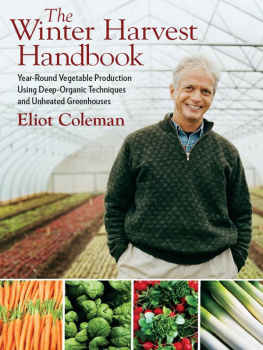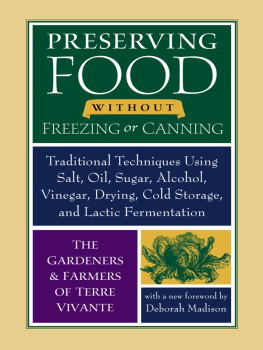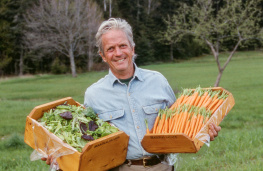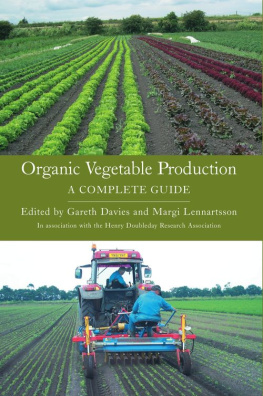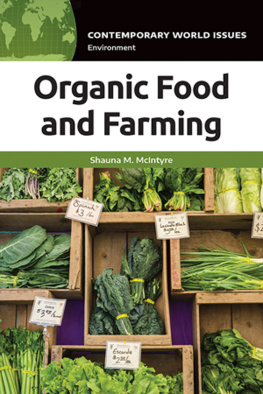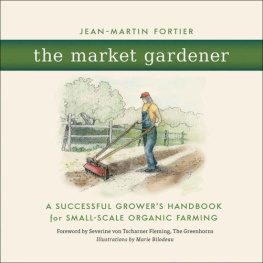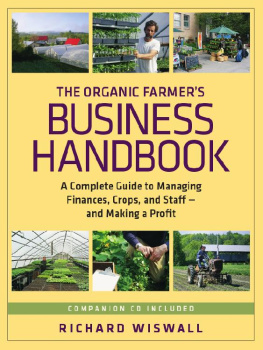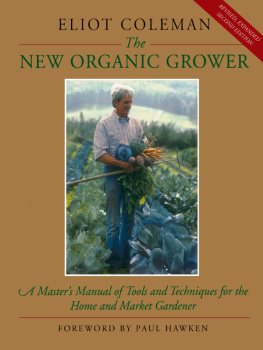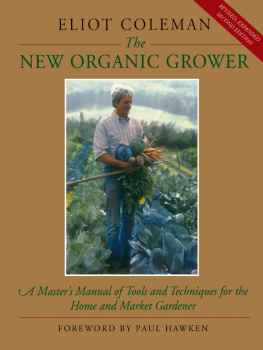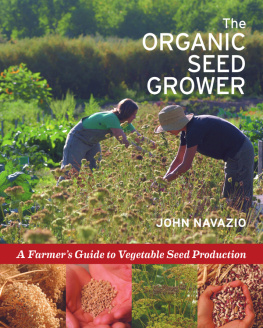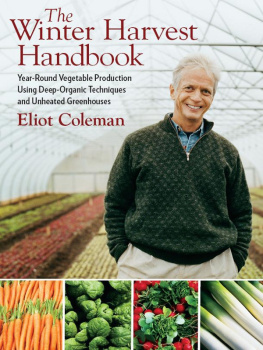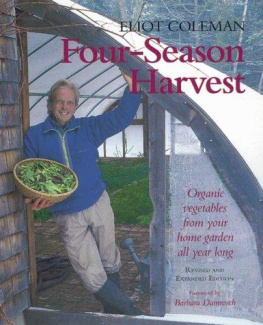Praise forThe Winter Harvest Handbook
How do you produce first-rate food all year-round in northern places? This is the big question facing the local food movement, and Eliot Coleman, one of Americas most innovative farmers, has come up with excellent answers. Brimming with ingenuity, hope, and eminently practical advice, The WinterHarvest Handbook is an indispensable contribution.
MICHAEL POLLAN, author of The Omnivores Dilemma and In Defense of Food
I just finished picking my first carrots, beets, and radishes from my new cold house in Bedford, New York. It is so rewarding to harvest fresh vegetables and salads in the middle of winter and I grow them following the techniques of Eliot Coleman. I have been a devotee of Eliots for years, fully agreeing with his methods for growing in winter, spring, summer, and fall, tasty, nutritious produce with a minimum consumption of fossil fuels. Congratulations on another volume of useful, practical, sensible, and enlightening information.
MARTHA STEWART, best-selling author, magazine publisher,
and Emmy Award-winning television producer and host
Eliot Colemans books have been called Bibles for small farmers and home gardeners. I suspect thats because he writes about not just gardening but about everything that connects to good food and pleasure; a Renaissance man for a new generation, hell quote Goethe in the same breath as Ghandi, and as a result, youll dig, weed, eat, think, and live more fully.
DAN BARBER, Chef, Blue Hill and Blue Hill Stone Barns
If we are going to create a good, clean, fair food system, weve got to learn how to grow affordable, local food year-round and make a living at it. Eliot Coleman knows more about this than anyone Ive met. Here he gives the detailed information needed to make it work. The only way to learn it better would be to follow him around for a few seasons.
JOSHUA VIERTEL, President, Slow Food USA
Attention to detail is the major secret to success in any endeavor, writes Eliot Coleman in this absorbing and happily detailed report on his ongoing efforts to grow flawless vegetables without hothouses on the frozen back side of the year. In chapters covering everything from The Yearly Schedule and Greenhouse Design to Weed Control and Marketing, Coleman tracks his own constant search for perfection, a quality that has led more than one young farmer to exclaim Id follow him anywhere. Well worth reading even if you dont grow vegetables, just to watch a masters mind at work.
JOAN DYE GUSSOW, author of This Organic Life
The Winter Harvest Handbook is a treasure trove of practical, proven techniques for producing crops on a year-round basis in any climate. Based on decades of on-farm research, this book is packed with useful ideas, tips and practices that anyone can use in pursuing the increasingly vital dream of local, organic food production using a minimum of precious resources. A masterful book from a master organic farmer. I wish I had had a copy 35 years ago!
AMIGO BOB CANTISANO, President, Organic Ag Advisors
Eliot Coleman is widely recognized as the master of the master gardeners. His new book, The Winter Harvest Handbookwhich tells us how to produce local food even in winter in cold climates like Maine, without a lot of energynow joins his other delightful books as another lovely read, packed with powerful and practical ideas that every gardener will treasure.
FREDERICK KIRSCHENMANN, Distinguished Fellow,
Leopold Center for Sustainable Agriculture, and President
of Stone Barns Center for Food and Agriculture

The
Winter Harvest
Handbook
Year-Round Vegetable Production
Using Deep-Organic Techniques
and Unheated Greenhouses
Eliot Coleman
Photographs and Illustrations
by Barbara Damrosch
CHELSEA GREEN PUBLISHING
WHITE RIVER JUNCTION, VERMONT
Copyright 2009 by Eliot Coleman. All rights reserved.
No part of this book may be transmitted or reproduced in any form by any means
without permission in writing from the publisher.
Project Manager: Emily Foote
Developmental Editor: Fern Bradley
Copy Editor: Cannon Labrie
Proofreader: Helen Walden
Indexer: Lee Lawton
Designer: Peter Holm, Sterling Hill Productions
Photographs and Illustrations: Barbara Damrosch, except where otherwise noted
Printed in the United States of America
First printing March, 2009
Our Commitment to Green Publishing
Chelsea Green sees publishing as a tool for cultural change and ecological stewardship. We strive to align our book manufacturing practices with our editorial mission and to reduce the impact of our business enterprise on the environment. We print our books and catalogs on chlorine-free recycled paper, using vegetable-based inks whenever possible. This book may cost slightly more because we use recycled paper, and we hope youll agree that its worth it. Chelsea Green is a member of the Green Press Initiative (www.greenpressinitiative.org), a nonprofit coalition of publishers, manufacturers, and authors working to protect the worlds endangered forests and conserve natural resources.
Library of Congress Cataloging-in-Publication Data
Coleman, Eliot, 1938
Winter harvest handbook : year-round organic vegetable production for
the twenty-first century / Eliot Coleman.
p. cm.
Includes bibliographical references.
ISBN 978-1-60358-081-6
1. Vegetable gardening. 2. Organic farming. 3. Greenhouse gardening.
4. Plants--Winter protection. I. Title.
SB324.3.C664 2009
635.0484--dc22
2008053184
Chelsea Green Publishing Company
Post Office Box 428
White River Junction, VT 05001
(802) 295-6300
www.chelseagreen.com
To the children who love our vegetables.
What business man, except a soil worker, will stop and talk with a stranger? Who but a farmer or fruit grower or gardener will tell of his experience so fully and so freely, and so entirely without hope of gain? Who else will so frankly reveal his business secrets for the benefit of his fellows? Who else so clearly recognizes the fact that the world is large enough for all mankind?
HENRY DREER
Dreers Vegetables Under Glass
One does not act rightly toward ones fellows if one does not know how to act rightly toward the earth.
LIBERTY HYDE BAILEY
The Holy Earth
Contents

1. Cool greenhouse
2. Seed-starting greenhouse
3. Cold frames
4. Quick hoops
5. Irrigation pond
6. Work shop
7. Movable greenhouses
8. Farm stand
9. Herb garden
10. Pastures and hay fields
11. Orchard
12. Tool shed
Our farm in Maine is both traditional and nontraditional. We are traditional during the growing seasonthe summer monthswhen we produce fresh vegetables for sale. But we also produce fresh vegetables for sale during the winter monthsthe back side of the calendar, so to speak. We achieve that winter harvest by growing cold-hardy salad and root crops in simple unheated greenhouses. Extending the season to the whole year (or at least most of it) means that we can hold our markets, keep our crew employed, and provide a more balanced year-round income. We believe our nontraditional winter vegetable production system has potential for growers in any part of the world where cold weather presently constrains production.
Next page
